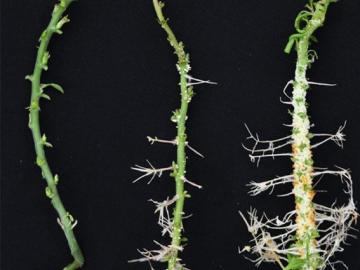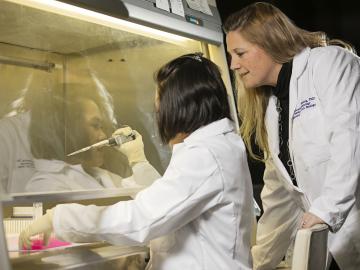Filter News
Area of Research
- (-) Biological Systems (2)
- (-) Neutron Data Analysis and Visualization (2)
- Advanced Manufacturing (15)
- Biology and Environment (32)
- Building Technologies (7)
- Chemical and Engineering Materials (1)
- Clean Energy (152)
- Climate and Environmental Systems (4)
- Computational Biology (1)
- Computational Engineering (2)
- Computer Science (10)
- Electricity and Smart Grid (1)
- Energy Sciences (2)
- Fossil Energy (1)
- Fusion and Fission (4)
- Fusion Energy (8)
- Isotope Development and Production (1)
- Isotopes (5)
- Materials (75)
- Materials for Computing (10)
- Mathematics (1)
- National Security (8)
- Neutron Science (35)
- Nuclear Science and Technology (18)
- Nuclear Systems Modeling, Simulation and Validation (2)
- Quantum information Science (3)
- Renewable Energy (2)
- Sensors and Controls (2)
- Supercomputing (41)
- Transportation Systems (2)
News Topics
Media Contacts

Oak Ridge National Laboratory scientists identified a gene “hotspot” in the poplar tree that triggers dramatically increased root growth. The discovery supports development of better bioenergy crops and other plants that can thrive in difficult conditions while storing more carbon belowground.

A new process to identify certain microbes in women could be used to diagnose endometriosis without invasive surgery, even before symptoms start. A collaborative research team including Oak Ridge National Laboratory analyzed bacteria from a small sample of premenopausal women undergoing laparoscopic surgery for suspected endometriosis.

Neutron measurements at Oak Ridge National Laboratory’s Spallation Neutron Source are giving physicists new insight into the behavior of quantum magnets. A research team led by Young-June Kim from the University of Toronto used neutron spectroscopy to observe a novel type of energ...

Crude oil refinement can be an extremely costly chemical process. In an effort to reduce energy and cost demands, Oak Ridge National Laboratory researchers Anibal Ramirez-Cuesta and Stuart Campbell are collaborating with University of Nottingham (UK) researchers to develop metal-orga...




